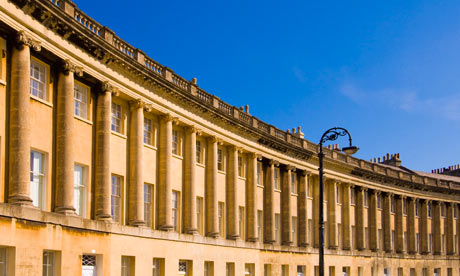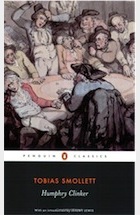Summer voyages: The Expedition Of Humphry Clinker by Tobias Smollett
A holiday journey around 18th-century Britain is irresistably sweet

'Sumptuous palace' ... Royal Crescent, Bath. Photograph: Trevor Smithers/Getty
It's a profound shame that the reputation of Tobias Smollett (1721-1771) seems to be waning. A few generations ago, he was part of the quartet of Great 18th-century Novelists, alongside Samuel Richardson, Henry Fielding and Laurence Sterne. George Eliot paid tribute to him in Middlemarch, when Brooke advises Casaubon: "Or get Dorothea to read you light things, Smollett – Roderick Random, Humphry Clinker. They are a little broad, but she may read anything now she's married, you know. I remember they made me laugh uncommonly – there's a droll bit about a postilion's breeches." Thackeray, in his English Humorists (overlooking the fact that Smollett was born in Dunbartonshire) wrote that: "The novel of 'Humphry Clinker' is, I do think, the most laughable story that has ever been written since the goodly art of novel-writing began". Robert Burns praised the "incomparable humour" of Smollett; Hazlitt called Humphry Clinker "the most pleasant gossiping novel that ever was written".
The Expedition Of Humphry Clinker is an epistolary novel, in which Matthew Bramble, his nephew Jery Melford, his sister Tabitha, his niece Lydia and Winifred, Tabitha's maid, all send letters to their friends describing their holiday from Gloucester, to Bath, to London, to Harrogate, to Durham, Edinburgh, to Glasgow and back home. The zestful fun of the novel comes from the characters' radically different perspectives on the places they visit. For example, the curmudgeonly Bramble is less than taken with Bath: "They look like the wreck of streets and squares disjointed by an earthquake, which hath broken the ground into a variety of holes and hillocks; or as if some Gothic devil had stuffed them altogether in a bag, and left them to stand higgledy piggledy, just as chance directed. What sort of a monster Bath will become in a few years, with those growing excrescences, may be easily conceived". Lydia, by contrast, says "Bath … to be sure, is an earthly paradise. The Square, the Circus, and the Parades, put you in mind of the sumptuous palaces represented in prints and pictures; and the new buildings, such as Princes-row, Harlequin's-row, Bladud's-row, and twenty other rows, look like so many enchanted castles, raised on hanging terraces." The Expedition Of Humphry Clinker begins the tradition of the novel as tourism. It is also the first to capitalise on the idea of multiple perspectives (although Christopher Anstey had pioneered the form in his New Bath Guide). With Humphry Clinker, we have the beginnings of the ironic polyphony that Bakhtin thought characterised the novel as a form.
There is a plot – involving romances, an illegitimate child, and the delightful Lieutenant Obadiah Lismahago – but on the whole it conforms to Walter Scott's dictum "what the deuce is a plot for except to bring in good things?" There are disquisitions on the Enlightenment, Methodism, the Union, the freedom of the press, and copious accounts of the different forms of hospitality available in each place (oysters kept in "slime-pits" in Colchester, the English visitors trying to deal with "haggice" – "a mess of minced lights, livers, suet, oat-meal, onions, and pepper, inclosed in a sheep's stomach, had a very sudden effect upon mine", the dreadful adulterated milk at Covent Garden). Smollett indulges in a little proto-postmodernism when Ferdinand Count Fathom, from his previous novel of that name, makes an appearance. Although the idea of the malapropism is conventionally linked to Sheridan's 1775 play The Rivals, it typifies the letters sent by the servant Winifred: "Oh Molly," she writes "you that live in the country have no deception of our doings in Bath", and she revels in "the very squintasense of satiety" they enjoy. "Matrimony" becomes "Mattermoney", as if to prefigure Jane Austen. She means more than she realises.
Sterne caricatured Smollett as "Smelfungus", on account of his irascible, cynical sarcasm: although Bramble begins very much in that vein, part of the charm of Humphry Clinker is in seeing how Bramble is himself charmed, becoming mellower over the course of the novel. Scott, in his biography of Smollett writes that "notwithstanding the general opinion denies that quality to his countrymen, Smollett excels in broad and ludicrous humour. His fancy seems to run riot in accumulating ridiculous circumstances one upon another, to the utter destruction of all power of gravity; and perhaps no books ever written have excited such peals of inextinguishable laughter as those of Smollett."
The voyage, Smollett suggests, is a chance to change: the Caledonian trip makes Bramble and his companions realise their prejudices about the Scots in particular, and anyone different in general. This was politically quite bold. At the time of publication, John Wilkes was stoking up anti-Scottish feeling in the pages of the North Briton, and Horace Walpole claimed that Humphry Clinker was "the profligate hireling Smollett" attempting to "vindicate the Scots". What he was doing was proving that the novel was a form that could create sympathy.
Byron, in Childe Harold's Pilgrimage, wrote of the "double joy" of admiring a landscape with a loved one. There's a quintuple joy in The Expedition of Humphry Clinker, as we learn to love these often eccentric, sometimes delusional, sometimes incisive characters and see 18th-century Britain through their eyes.


Nenhum comentário:
Postar um comentário